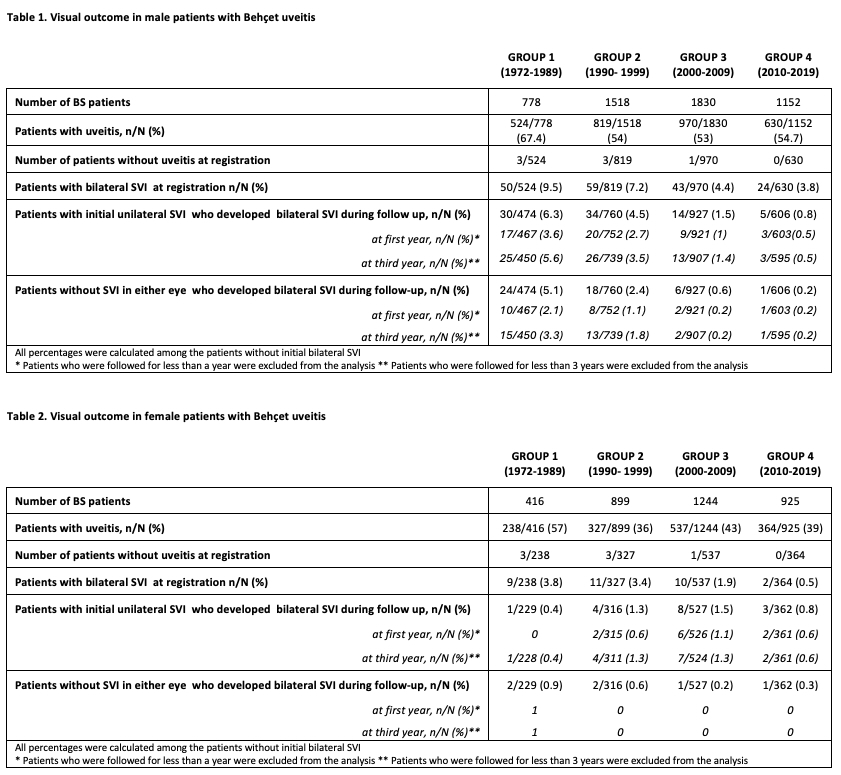Session Information
Date: Tuesday, October 28, 2025
Title: (2524–2546) Vasculitis – Non-ANCA-Associated & Related Disorders Poster III
Session Type: Poster Session C
Session Time: 10:30AM-12:30PM
Background/Purpose: There is consensus that the visual prognosis in Behçet syndrome (BS) uveitis has considerably improved in time (1-3). We wanted to better quantitate this impression. To tabulate the prognosis of Behçet syndrome uveitis in the previous four decades in a dedicated BS outpatient clinic by utilizing a severe and irreversible visual acuity impairment definition as the main outcome measure.
Methods: Medical records of 9289 BS patients registered between the years 1976 and 2019 were screened for the presence of uveitis and severe visual impairment (SVI). SVI was defined as an irreversible visual acuity of ≤20/200 for at least 3 months. A standard form was used for retrieving data on demographics, clinical features, visual acuity, and treatments. Records with no or inadequate data (n=527) were excluded. The remaining 8762 patients were analyzed in 4 different time periods according to the first registration year (G1: < 1990, G2: 1990- 1999, G3:2000-2009, G4:2010-2019). Men and women were analyzed separately.
Results: A total of 4409/8762 (50.3%) BS patients had uveitis during their disease course, and 776 /4409 (17.6%) of whom had SVI in either or both eyes. Among the patients who had SVI, 767 had uveitis at the time of the registration, as shown in Tables 1 and 2. They show that males had more frequent and severe uveitis in all time periods. Since there were a relatively small number of female patients with SVI, the results were formally analyzed only for males. The frequency of SVI decreased in time. This was true both among the patients with no SVI in either eye at the time of registration or the development of the presence of SVI only in one eye at the time of registration. Of particular note is that this decrease was considerably more pronounced among the male BS uveitis patients initially with no SVI, as seen in Table 1. In men, the proportion of patients progressing from unilateral to bilateral SVI was higher in the before-2000 group (64/199, 32%) compared to the after-2000 group (19/118, 16%) [χ² = 9.8, p = 0.002]. Azathioprine was the most frequently used immunosuppressive, with 46% in G1 and 80-89% among the G2-4 patients. Similarly, no patients had used a-TNF agents in G1, 3 patients in G2, 12% of the patients in G3, and 38% in G4.
Conclusion: These data further emphasize the strikingly different disease course of BS uveitis between males and females. They also confirm the contention that we can currently much more effectively manage BS uveitis. We propose that the SVI definition we use strongly reflects better medical management rather than a milder natural disease course at recent times. This is supported by the more pronounced decrease in the frequency of bilateral SVI over time among BS uveitis patients who initially had no SVI, compared to those with unilateral SVI at the time of their registration in our clinic. Finally, our observations also emphasize that formal drug trials in BS uveitis should either be conducted separately in either sex or include enough patients of either sex to allow a meaningful analysis of the trial outcomes.
To cite this abstract in AMA style:
Erdogan M, Tascilar K, Ersoya Y, Ozcan A, Gurcan M, Ammar T, Esatoglu S, Ozguler Y, Hatemi G, Yazici H. Severe Visual Impairment in Behçet Syndrome in Time: A Comparison of Four Time Periods [abstract]. Arthritis Rheumatol. 2025; 77 (suppl 9). https://acrabstracts.org/abstract/severe-visual-impairment-in-behcet-syndrome-in-time-a-comparison-of-four-time-periods/. Accessed .« Back to ACR Convergence 2025
ACR Meeting Abstracts - https://acrabstracts.org/abstract/severe-visual-impairment-in-behcet-syndrome-in-time-a-comparison-of-four-time-periods/

